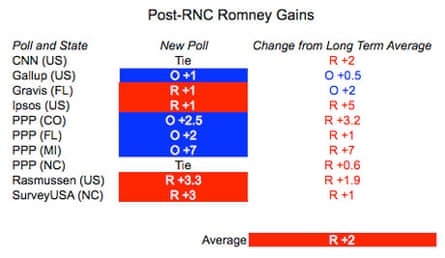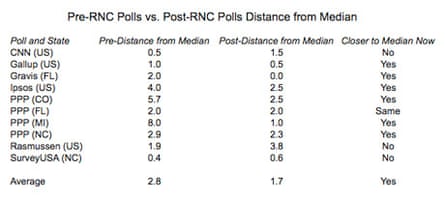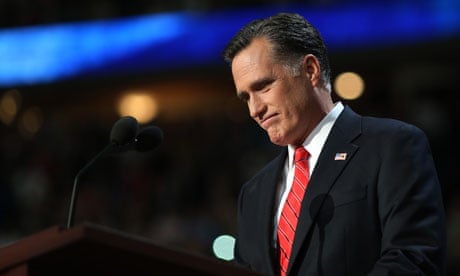The Republican National Convention has come and gone. Besides wondering whether Invisible Obama could be a metal, plastic or wooden chair, it has left us with the bigger question of whether or not Mitt Romney has received a bounce thanks to the convention.
Some solid articles have been written on the existence of such a bounce, but let me add five key points to the bounce discussion.
1. There's no uniformity on whether Romney has received a bounce
Looking at both the national and state polling, Romney seems to have gained a little: he's up 2 points on average. That doesn't tell the whole story, though, for the range in the polling is wide.

If you believe Ipsos' online polling, Romney received a major bump. He gained 5.5 points because of the convention. On the other hand, Gravis Marketing has Romney losing ground in Florida.
Complicating the question of a bounce is that any movement may not even be a bounce. For instance, Rasmussen has had Romney leading by greater than 3 points many times over the past months. If Romney had taken a 4-point lead in their polling at any other point, everyone would just be saying it was statistical noise. I'm not sure why we should say anything different this time around.
Other polls like Gravis have had so few polls published this cycle that trying to judge anything off their longer-term average is probably akin to picking a kid out of a class at random and declaring him or her to be the average height of the entire class.
2. The pollsters with the biggest jumps are mere reversions to the mean
Before the conventions, I noted the polling medians in the key swing states and in the United States. Two of the pollsters who tended to be most favorable for Obama were Public Policy Polling in states such as Colorado and Michigan, and Ipsos in their national polling. These were the pollsters who have also tended to see the biggest Romney bounce.

It's certainly possible that this bounce is real, and other pollsters who saw more favorable pre-convention numbers for Romney would see bounces. It's also possible that these pollsters have now replaced an outlier result with something closer to the truth. Backing up this reversion-to-the-mean argument is that Gallup nationally and Gravis in Florida were pollsters who had Romney-friendly results prior to the convention, and their new numbers are among the few that have been less favorable to Romney post-convention.
Indeed, the only pollster who had very favorable numbers for Romney v the median prior to the convention and gave him a "bounce" post-RNC is Rasmussen. Rasmussen, as noted, has seen pro-Romney movements like this before.
3. Mitt Romney could conceivably be leading if the election were held right now
In the lead-up to the RNC, the long-term median had Obama ahead by about 1.5 points. The average bump for Romney seems to be in the neighborhood of 2 points. That means Romney could be ahead nationally by about 0.5 points just now. It would be the first time that Mitt Romney has led in the polling average all year.
4. Romney's bump means nothing without knowing what Obama's may be
The main reason analysts are interested in the bounce is not because of its immediate effect, but because of its ability to upend the long-term trend. If Obama also gains 2 points in the polls after the Democratic National Convention, then Romney's bounce means nothing.
Analysis before the conventions hinted that Romney would receive a bigger bounce than Obama. The fact that Romney may have performed worse compared to expectation may reflect poorly on him, but it may also foreshadow the fact that Obama, too, will get less of a bounce than expected.
5. Overall, we have very little data
A few hours earlier Monday, Real Clear Politics' Sean Trende tweeted me: "I'm really unsure about these holiday weekend polls." Response rates for polling are already at their worst levels ever. When you add on the fact that many people were away for the Labor Day weekend, response rates might have been even lower.
We also have very few polls to judge a bounce on, and nearly half of the polls released post-convention come from Public Policy Polling. We also don't have a track record for Ipsos internet polls before the beginning of the RNC.
It will be easier to judge both Romney's and Obama's bounce as we get more data over time.
Conclusion
Right now, it's probably too early to judge whether or not Romney has got any bounce from the RNC, and whether that bounce will actually last. Both CNN and Public Policy Polling have shown Romney making strides in favorability. In fact, Romney's favorables are now 7 points higher than Obama's in CNN's latest poll. If that were to hold until November, Romney would likely win.
At this point, however, any bounce seems minimal. We need to wait a few weeks to understand better where the candidates stand as they go into the final two months of the contest.
